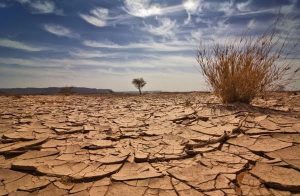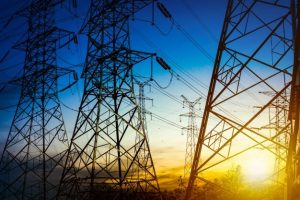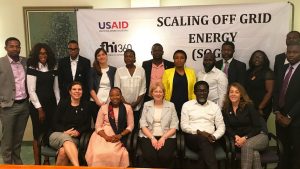By Ifeoma Malo and Segun Adaju
As Nigerians marks the 56th year of the country’s independence today, several citizens of our great nation continue to struggle with basic amenities including the lack of electricity supply. More importantly, the impact of our current electrification rates are felt more by a majority of the rural poor.
To feel the impact of this freedom and prosperity enshrined under our Independence Day declarations, it is important that we think of collective ways to create conditions for Nigerians to achieve their optimal socio-economic goals. We must make issues of energy access a priority and this is why we believe that Nigeria needs an ENERGY REVOLUTION.
In 2013, Nigeria reportedly ranked 25 (from the bottom) on power consumption per capita, with reported estimates for the demand for electricity in Nigeria, to be in the region of 12,800MW as of January, 2016. Based on the country’s current GDP and global trends, Nigeria’s electricity consumption should be four to five times higher than it is today. However, at just 126kWh per capita, as a country we lag far behind other developing nations in terms of grid-based electricity consumption. For example, Ghana’s per capita consumption (361kWh) is about 2.9 times higher than that of Nigeria, and South Africa’s (3,926kWh) is 31 times higher.
Nigeria’s current grid capacity is able to generate about 12,000 megawatts and yet only 5000 megawatts is actually available to meet the needs of the country’s teeming population. This means that about 60% of Nigerians lack access to the grid. This lag between demand for electricity and available supply means that many Nigerian businesses and home owners are in the business of widespread self-generation of power for their commercial, industrial and residential uses. Furthermore, with an ageing grid system, several Nigerians connected to the grid face extensive power outages due to low reliability from the grid. Therefore, the use of diesel fuelled generators as an alternative to the grid and kerosene lamps for the rural poor are still widespread and compensate for the lack of electricity supply across the country. Furthermore the increased militancy on oil and gas pipeline means that there will be increasingly low reliability to generate power from the grid.
However, there is another path-way that is a cheaper, simpler and more sustainable way to get electrified in Nigeria. That way is through Decentralized Renewable Energy; more specifically, mini-grid systems and stand-alone home systems. These systems are easy to deploy – usually within a 6 months’ time frame; and the costs for the end user, especially when spread-out over time are comparable to both grid based electricity connections. Decentralized Renewable Energy is certainly cheaper than the diesel and kerosene alternatives that many Nigerians currently deploy in their self-generation efforts.
However, there is another path-way that is a cheaper, simpler and more sustainable way to get electrified in Nigeria. That way is through Decentralized Renewable Energy; more specifically, mini-grid systems and stand-alone home systems.
The market for Decentralized Renewables market in Nigeria is at the cusp of a major take-off, however some of the market enablers for this market to truly emerge are not yet in place. Despite little incentives from the government for private investor participation, we have seen increasing interest and projects targeted at this market. There are several programs and projects springing up in several rural and peri-urban communities across Nigeria either as pilots or commercial ventures and increasing more-so in urban centres across the country. These projects are funded either with capital from grant donors or through commercial partnerships including bank loans and credit facilities. The projects range from Stand-alone Home systems (SHS), mini grids systems as well as solar home appliances such as lamps and cooking stoves. Yet for this market to scale up and meet the latent demand for electricity across the country there has to be the right enabling policies and market incentives for this to happen. It is also important to have clear targets and timelines for the Decentralized Renewable Energy sector and broad support by stakeholders.
This is why the preparations for the emergence of an industry association to help catalyze a collective voice for the sector is one of the most important things happening in recent times. This industry association aims to be a reputable umbrella association, supporting and enabling the sustainable growth of the renewable energy sector throughout Nigeria. The mission of the association is to promote all forms of renewable energy technologies into the mainstream of the Nigerian economy and lifestyle by emphasizing the need for quality and best practices in the sector for the benefit of members, consumers and other stakeholders. The association also seeks to facilitate information dissemination, formulate proposals for improvements in the renewable energy sector and make recommendations to the responsible governing and policy authorities amongst the other stated goals. We believe that decentralized renewable energy will play an important role in meeting these objectives and will help in activating and supporting the market in sustainable ways, particularly as this sub-sector is the quickest and cheapest way to grow the renewable energy industry and market overall.
One of the best ways to accelerate our renewable energy rates and penetration is to integrate rural access with decentralized renewable energy development in Nigeria. With the high demand for electricity amongst urban and rural dwellers, and with Nigeria having one of the best solar radiation rates in the world, achieving rural access electrification is a quick win using Decentralized Renewable Energy. With several countries in East Africa like Kenya, Tanzania, and Uganda, already leading the way in deploying decentralized renewable energy to increase and optimize their electrification rates, particularly in rural communities, Nigeria cannot afford to be left behind. Although, financing the sector remains a challenge, the government with active stakeholder participation can make policies, and build partnerships with the private sector to subsidize the cost of financing such projects in rural Nigeria to solve the country’s energy challenge.
The opportunity for Decentralized Renewable Energy especially solar energy to advance Nigeria’s energy access is so large that it has become hard to ignore. This is why, Power For All – a global decentralized renewable energy campaign organization as part of its mission in Nigeria, is participating in resource mobilization for the DRE sector on behalf of stakeholders. The Power For All campaign promotes technology transfer, promotes sound business practices and standardization of products within the sector and promotes enterprise development. The campaign provides platforms to share information, and provides tools to accelerate the growth of the DRE market. The Power for All campaign further sees distributed renewable energy (DRE) as the key to achieving universal energy and the main way to exit Nigeria from her current shortfall in energy access.
It is clear that Nigerians have a choice. To choose the old pathway to electrification through on-grid methodologies; which has kept electricity access rates static for many years now, or choose a new path which involves making decentralized renewable energy main stream to meet improved electrification rate.
It is clear that Nigerians have a choice. To choose the old pathway to electrification through on-grid methodologies; which has kept electricity access rates static for many years now, or choose a new path which involves making decentralized renewable energy main stream to meet improved electrification rate. As many Nigerians, especially the growing workforce of the country, buoy by the teeming youth population depend on electricity to make ends meet it is clear that turning around our current economic crisis while growing and contributing to the GDP of the country, is dependent on deploying Decentralized Renewable Energy. The time to gain independence from blackouts is now. The time to act is NOW!! Decentralized Renewable Energy provides the way forward.
Ms. Ifeoma Malo is the Campaign Director for Power For All in Nigeria and is Co – Founder of the Clean Tech Hub
Mr. Segun Adaju is the interim president for the newly formed industry stakeholders association (REAN) and CEO of Consistent Energy





